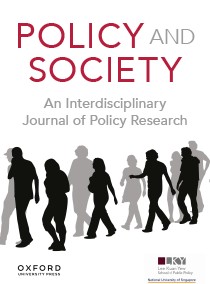通过新西兰的网络治理培养卫生政策能力:从政策执行的不同故事中学习
IF 5.7
1区 社会学
Q1 POLITICAL SCIENCE
引用次数: 4
摘要
Wu、Howlett和Ramesh对政策能力的理解已被用于确定特定司法管辖区和卫生等政策部门的一般优势和劣势。在这项工作的延伸中,Howlett和Ramesh认为,政策部门的治理模式强调了政策能力的特定要素的重要性。在本文中,我们重点关注新西兰的系统级措施框架(SLMF)的实施,该框架专门关注卫生系统的改进,旨在通过促进地方一级的网络治理来实现这一目标。然而,这一政策是在这样一个背景下提出的,即在新西兰卫生政策中,哪种治理模式——网络模式还是等级模式——占主导地位一直存在重大争议。通过探索执行SLMF的三个不同的地方案例,我们提出了三个论点,有助于政策能力和健康方面的文献。首先,组织间的地方历史在形成卫生政策能力方面发挥着至关重要的作用。其次,理解操作、政治和分析政策能力之间的动态和反馈循环至关重要。网络治理和分层治理的特点是对政策能力要素的内容及其动态关联方式的理解截然不同。第三,发展与网络治理兼容的政策能力的关键挑战是,当业务、政治和分析政策能力之间的联系无法建立时,如何促进这种能力。本文章由计算机程序翻译,如有差异,请以英文原文为准。
Cultivating health policy capacity through network governance in New Zealand: learning from divergent stories of policy implementation
Wu, Howlett, and Ramesh’s understanding of policy capacity has been used to identify generalizable strengths and weaknesses of specific jurisdictions and policy sectors such as health. In an extension of this work, Howlett and Ramesh have argued that the mode of governance of a policy sector accentuates the importance of specific elements of policy capacity. In this paper we focus on the implementation of the System Level Measures Framework (SLMF) in New Zealand that has been specifically focused on health systems improvement and which aimed to do so by fostering network governance at the local level. However, this policy is introduced in a context in which there has been significant contestation regarding which mode of governance—network or hierarchy—is dominant in New Zealand health policy. By exploring three divergent local cases of implementation of the SLMF we develop three arguments that contribute to the literature on policy capacity and health. Firstly, local histories of interorganizational play a crucial role in shaping health policy capacity. Secondly, it is crucially important to understand the dynamics and feedback loops between operational, political, and analytical policy capacity. Network and hierarchical governance are characterized by distinct and contrasting understandings of the content of policy capacity elements and of the way in which they are dynamically related. Thirdly, the key challenge in developing policy capacity compatible with network governance is how to facilitate this capacity when connections between operational, political, and analytical policy capacity fail to fire.
求助全文
通过发布文献求助,成功后即可免费获取论文全文。
去求助
来源期刊

Policy and Society
Multiple-
CiteScore
18.00
自引率
6.50%
发文量
43
审稿时长
30 weeks
期刊介绍:
Policy and Society is a prominent international open-access journal publishing peer-reviewed research on critical issues in policy theory and practice across local, national, and international levels. The journal seeks to comprehend the origin, functioning, and implications of policies within broader political, social, and economic contexts. It publishes themed issues regularly and, starting in 2023, will also feature non-themed individual submissions.
 求助内容:
求助内容: 应助结果提醒方式:
应助结果提醒方式:


